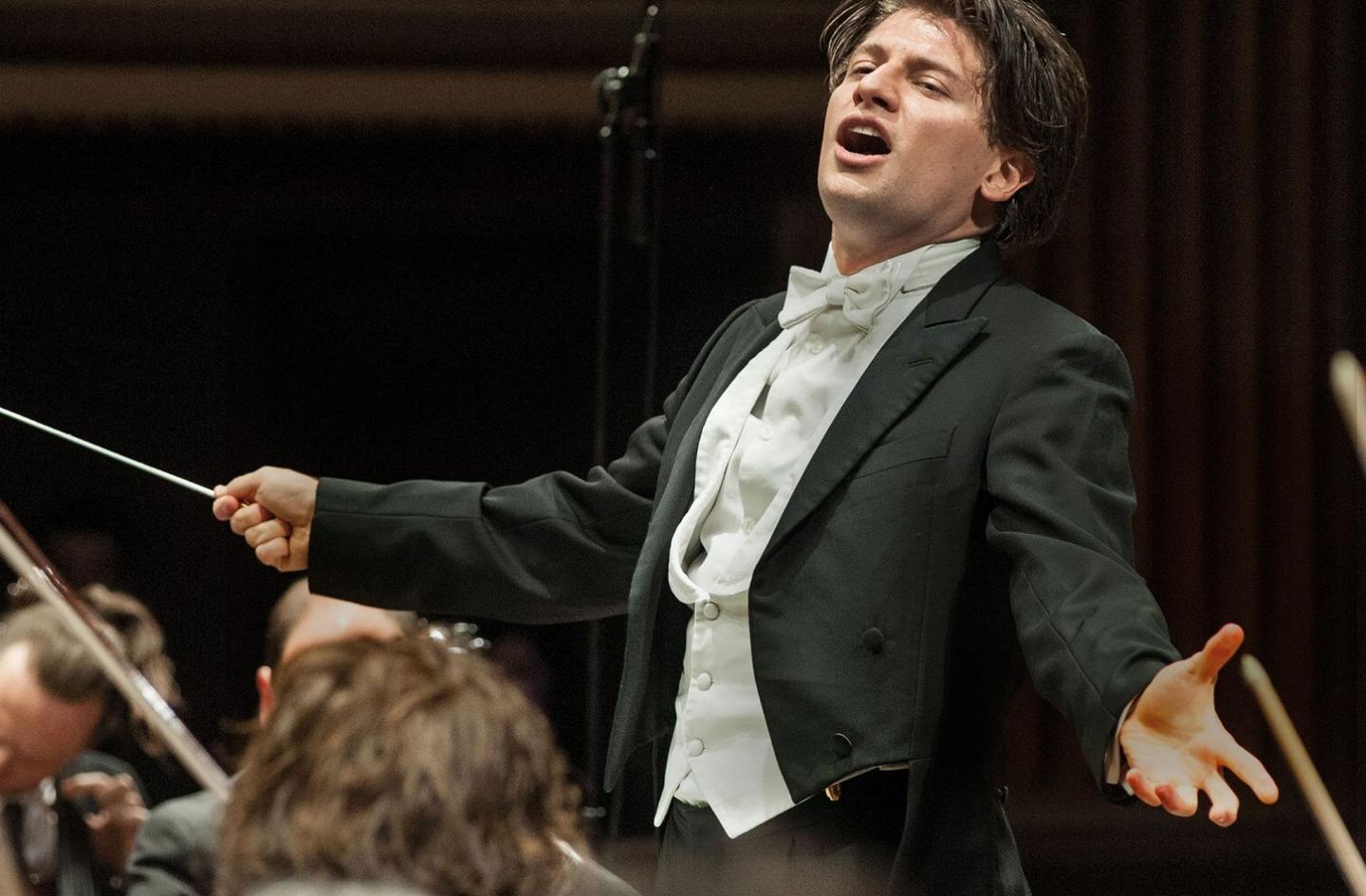Rattle's Mahler Third – or Mahler's?
mainThe Berlin Philharmonic Orchestra under Sir Simon Rattle gave a performance tonight in London of Mahler’s Third Symphony that was more perfect than I could ever have imagined, and more puzzling.
Every instrumental effect from the blare of brass at the opening to the ee-awing donkeys in the third, from the reverse glissando on the oboe to the ppp that precedes the contralto soloist, was achieved with a superhuman precision of a kind that Nietzsche (who wrote the words) might have appreciated. Never have offstage instruments resonated so well in the Royal Festival Hall. And the great adagio of a finale soared into a cloudless sky, no hint of a flaw to be contemplated.
This is an orchestra that plays physically into itself, the chairs half turned inwards, the players attuned to one another with symbiotic intuition. The Berlin Philharmonic may well be the finest orchestra on earth and, if the body language gives off an excess of self-satisfaction, the pride is nothing if not deserved. Rattle has done more than maintain this corporate ethos: he has hugely enhanced it.
The problematic aspect, for me, was the absence from the opening bars onwards of any of Mahler’s underlying ironies and savageries. Beauty was the object of the exercise, at the expense of a multitude of subversive suggestions. This was not a performance that ran deep. Rather, it recalled Herbert von Karajan’s stated preference for the absence of meaning in music. In Mahler, that reverses the composer’s purpose.

Rattle has come a long way since he first conducted Mahler in Birmingham thirty years ago. His recent recording of the second symphony was a measured advance on his early efforts, the build-up of power conserved with calculated restraint to achieve maximum resurrective impact. In the third symphony, on the other hand, he has regressed from youthful exuberance to a well-worked strategy that drains the work of the possibility of controversy.
Nathalie Stutzmann was the contralto soloist, her voice blending into the orchestra somewhere between clarinet and bassoon. The Ladies of the London Symphony Chorus and the BBC Singers never sang louder than lovely and the boys of Eltham College Choir were totally sweet.
The symphony was preceded by two songs, one of Brahms the other of Wolf, conjoining Mahler to his forbears. That, like much else in the concert, seemed a little too pat. It tamed Mahler, depriving him of the ragged colours of a musical revolutionary.





As I left the RFH last night I wondered what you would write and I am not that surprised. Your view is cogent and in principle I dont disagree. However, I think there is another dynamic at play here that is worth mentioning. The orchestra’s economic success is in large part due to a very strong link to its constituency of supporters, the members of which not only foster this beauty you mention, but rather insist on it. This, by the way, was much more evident at the Barbican the evening before with Haydn and Schubert Symphonies – which deserve a little rant at some other stage. Rattle may have attempted to bring some ‘progressive’ programming and thoughts earlier on in his tenure but the subscribers and orchestra soon set him straight. Back to the Karajan gloss and economic certainty.
As you well know, if you ask any of the members of the orchestra they maintain they can play by themselves, although, this is only mentioned in the context of a conductor who is not in favour. It will not be said out aloud with Rattle in mind as he is part of the success formula now and it would be economically counterintuitive to slag him off. I wonder then if the title to this shouldn’t read; BPO’s Mahler Third – or Mahler’s.
NL: Very good point.
I thought that the Mahler last night was incredibly incredibly well performed yet unsatisfying. I give the orchestra the highest marks possible and then a bit – especially the principal horn (and on the Wolf even more than the Mahler) and the astounding off-stage posthorn solo was leagues above any performance I’ve heard before. The dynamic range was astounding as was the ensemble playing; it was lovely to watch the two tympanists watching each other.
But I walked out unsatisfied. Sir Simon simply did not engage me as Mahler usually does.
At the risk of alienating a few thousand people, I thought I would share my thoughts on the concert the night before.
The Berlin Philharmonic presented a sandwich of Haydn, Hosokawa and Schubert at the Barbican concert on Tuesday evening. The Horn concerto, in its second outing, was a refreshing display of bravura orchestration that played to the formidable strengths of this famous band. Wonderfully layered and orientally influenced percussion writing was complemented by a nod to the current trend of 3D, by the deployment of 2 horns a trumpet and Trombone in amongst the audience. Stefan Dohr’s mastery of his instrument was not exactly challenged in the writing, but on the positive side was at least it was not a self-serving indulgence. Certainly a work to hear again.
Moving on from the highlight of the evening. The opening Haydn Symphony (No. 99) was timid and careful. Although perfect in its ensemble playing it lacked definition and the strings provided a stifled, non-descript carpet to the very accomplished solo wind players’ musings.
Finally the Great C major, with a larger string section, provided more dynamic range which Rattle exploited with formulaic crescendi and decrescendi, which showed off the orchestra’s ability to follow gestures more than it did to deliver moving musical content. The unending, muscle-cramping string passages in the finale were attacked with some ferociousness that was breathtaking in its display of orchestra technique, but lacking in charm and flexibility.
This sandwich was like one one would expect from a 3 Star Michelin take-way. Gorgeous, succulent and sumptuous, but by the time you are half-way home you are hungry again and left wondering why you paid so much.
It seems to me many conductors turn to Mahler in order to summon the beacon of light that is fame in the modern musical world, not for the depth and complexity of his music. This goes for Abbado, Dudamel and many others. Thanks to Bernstein, conducting a Mahler cycle signifies tolerance, wordliness and musical greatness. But very few people have entered his music from the heart, and you can hear the difference.
Rattle Mahler is often substandadrd, but it’s humorous that Lebrecht and his lappers take this opportunity to direct more shots at Karajan. Please refer me to a Karajan Mahler 3rd.
Better yet, clean the ears and minds and do listen to Karajan’s Mahler 9s.
I am a bit surprised and even feeling sad to read the comments. I had the privelege to listen to the performace in Berlin on 05 FEB – and agreed with a critic in TAGESSPIEGEL newspaper, that “the majority of the international music scene would come on knees to experience this event”… And others appraised the last movement as “just the best I heard in my life”. So what happened in London?
Well, I don’t know, if the easiest explanation works, as the GUARDIAN said the “BRAVI”-shouter ruined a whole concert. I know how much this can annoy. By the way: Some applause after the first movement in Berlin…
But I really wonder if something else could have been the reason for feelings like “I walked out unsatisfied” while I left (and next day still considered it) with a feeling of having participated in a great spiritual experience.
So what could have been the differences?
Beside the BRAVI I found four possibilities:
1. They had a bad day and did not play well technically – not very likely for what I can read.
2. The choirs have been different, worse and ruined it – which I would also doubt, though the Berlin Radio Choir is considered to be Top End, but again someone would have mentioned it, I assume.
3. Lack of emotional exchange between audience and stage – well…if there are lot’s of distant or very critical listener in the audience, already coming with the expection to get proofed, they don’t like Rattle’s Mahler, it will definitely reflect in the performance. In my view there is a lot of interaction. Just one example: I was about to whisper to my neighboor after the first movement, “Did you notice the tension in the audience?” That moment some listeners started applauding – obviously the tension made them doing some (silly) relief action. Each of the writers below might ask themselves, what was their expection (“Rattle Mahler is often substandard”) – would you probably like to revalue taking this into account?
4. The performance was designed for the Berliner Philharmonie – sound wise and audience wise. Sound wise it might be obvious, audience wise I refer again to no. 3: Here in Berlin Rattle is the Great Magician and people (like me) are coming with so much enthusiasm. And – especially with Mahler – you feel it during the performance.
After attending the second I was convinced it could hardly be played better. After the third I thought, I could not even think it could be played different.
Just recently heard the forth and come to the conclusion:
MAHLER – RATTLE – BERLIN PHILHARMONICS …this is, where others have “The Trinity”.
Well, I have a similar experience of two consequtive Mahler 3rds by BPO in 1999, which sounded to me quite dissimilar. The conductor in both was Claudio Abbado. The earlier concert took place in London RFH, where it was recorded and issued on CD by Deutsche Grammophon. A week later the BPO traveled to Athens and gave the same concert (with different choruses), which I attended live. Compared to my live experience in Athens the London concert on CD sounded a bit more slow, even sluggish. Maybe, the knowledge of beeing recorded had called for more cautiousness and added a bit of stress the players, which was absent in Athens.
I watched the Belrin Mahler 3rd of Simon Rattle on BPO’s Digital Concert Hall on 5 Feb 2011. I aggree that the playing was impeccable and beauty of sound evident throughout. Beauty is the equivalent of genius, to quote Oscar Wilde from the Picture of Dorian Gray. However beauty that is given, makes ever less importance after the first encounter. Love in Mahler’s third is hard won, not given. Because Mahler’s is a quest for true love. Its this very journey through the agonies and ironies, sorrows, fears and betrayals that is missing in most performances. Maybe, though, Digital Concert Hall listening deprived me of the theatrical elements of the 3rd. Anyway, to be honest, Ratte and BPO were a joy to listen to.
I recently heard Rattle and the BPO in Singapore on their Asian Tour and watched the Mahler Third on the Digital Concert Hall, and through the way the pieces were performed, I am convinced that Rattle and the BPO approaches Mahler from a purely musical point of view, treating each symphony as an impeccably written piece of ensemble music. I don’t feel Rattle imposes the need for ironies or savageries or any philosophical dimensions onto the music. He paces it and phrases it and allows the musicians to play. They let the music be.